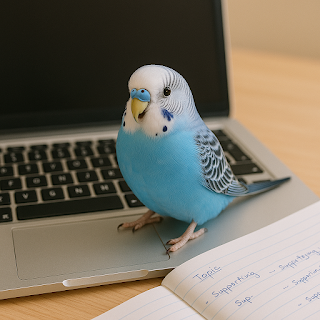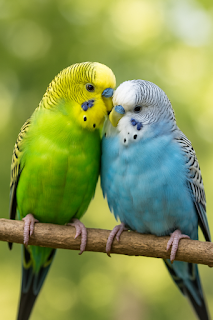Hey, feather-loving friends!
Welcome back to Myth Busting Monday, where we politely wrestle pet myths to the ground and sprinkle the truth on top like tasty millet.
What’s the Myth?
“Parakeets are too noisy and annoying. All they do is squawk, squawk, squawk.”
Sounds familiar? This idea keeps many potential bird parents from discovering just how delightful, intelligent, and communicative these tiny parrots can be.
Meet the Parakeet: The Pocket Parrot with a Big Personality
If parrots were a rock band, the parakeet (a.k.a budgerigar or simply budgie) would be the unstoppable lead singer - tiny in size, massive in stage presence.
The Symphony of a Budgie: Decoding Their Vocal Magic
A parakeet’s vocal range is basically a greatest hits album of bird sounds:
- Chirps: Short, soft “all’s good” notes - like a polite “Hi, I’m here!” to you and any feathered buddies.
- Trills & Warbles: Long, musical runs - usually when they’re feeling relaxed, flirty, or showing off.
- Squawks: Sharp, sudden bursts - “Hey! Pay attention!” or “I don’t like that!”
- Mimicry: Some learn human words or household sounds. Don’t be surprised if your budgie masterfully imitates your phone’s ping and watches you run to check it - little pranksters!
Fun fact: Male parakeets are the best talkers. In the bird dating world, the more musical the boy, the more impressed the lady budgies.
How It Really Works
1. Chirping = Communication
- “Hey, flock! I’m here and I’m fine!”
- “I love this new toy!”
- “This seed tastes heavenly!”
- Or, occasionally, “I’m bored, pay attention to me!”
In the wild, parakeets rely on constant chatter to:
- Maintain contact with flockmates
- Signal safe feeding spots
- Warn of predators
- Attract mates
- Teach young birds social calls
At home, you become their flock. So, the chatter continues - congratulations, you’re now an honorary budgie!
2. Noisy or Lonely?
Solution? Plenty of toys, daily interaction, or even better a feathered buddy!
A Little Vet Vortex Storytime
Back in my undergrad days, I “bird-sat” for my neighbor’s blue budgie named Professor Beaky. I thought: How much trouble could 30 grams of fluff cause?
Answer: A lot.
Professor Beaky would sing exactly when I needed silence for Zoom classes but the minute I paused to talk to him, he’d hop on my laptop and fall asleep on the keyboard. Turns out, he didn’t want to annoy me. He wanted a conversation… or at least to supervise my homework.
Moral of my misadventure: Budgies aren’t background decoration, they’re companions craving connection.
Behind the Squawk: What Makes Parakeets Vocalize
Let’s get nuanced: budgie “noise” is shaped by several factors:
- Social Needs: Parakeets are flock animals. Isolation triggers louder or repetitive calling to find company.
- Boredom: Lack of toys or stimulation = loud calls to express frustration or attract attention.
- Mimicry Instinct: Parakeets are natural mimics. Some learn human phrases, doorbells, phone rings, and repeat them endlessly for fun.
- Hormonal Phases: During mating season or hormonal surges, both males and females can get more vocal.
- Health & Environment: Sudden loud squawking can mean pain, fear, or environmental stress (like loud TV, smoke, or predators near the window).
What Pet Parents Can Do
1. Understand Normal vs. Problem Noise:
2. Enrich, Enrich, Enrich: Provide a stimulating cage: ladders, mirrors, swings, shreddable toys. Rotate toys every few days to keep things fresh.
3. Quality Time: Talk to your parakeet daily. Let them sit on your finger. Teach simple tricks - they love showing off!
4. Consider a Friend: If you can’t commit to daily hangouts, adopt a pair (same sex to avoid surprise babies!). A budgie buddy equals less lonely shrieking.
5. Train Quiet Times: Budgies can learn “quiet time” cues. Dim the lights or cover the cage for naps. Consistency helps.
6. Mind the Environment: Loud TVs, blaring music, or barking dogs can trigger defensive chatter. Keep their environment calm.
What a Vet Can Do
A vet can help if:
- Your parakeet’s noise suddenly changes (no more singing, or sudden screaming)
- There’s excessive squawking paired with fluffed feathers, lethargy, or loss of appetite
- You need advice on behavior or enrichment
Sometimes, noise signals illness or stress - so a wellness check never hurts.
Prevention & Long-Term Happiness
- Adopt from reputable breeders or rescues - hand-tamed budgies are often calmer and better socialized.
- Learn basic bird body language. A parakeet who trusts you is less likely to screech for attention.
- Keep their schedule regular: same sleep/wake times, consistent feeding, predictable interaction.
Prognosis
Zoonotic Implications: Can Budgie Chatter Hurt You?
In general, healthy pet budgies pose very little risk to their human flockmates. But it’s always smart to know the one notable exception:
Psittacosis (Parrot Fever)
This is a rare bacterial infection caused by Chlamydia psittaci. It can spread to humans through inhaling dust from dried droppings or direct contact with a sick bird’s respiratory secretions. Symptoms in people can feel flu-like - fever, headache, and cough.
Good news: It’s uncommon, treatable, and easy to prevent with basic hygiene.
Prevention:
- Keep cages clean - remove droppings, replace liners, and wash perches.
- Wash hands after handling birds, food bowls, or toys.
- Take sick birds (fluffed up, sleepy, breathing oddly) to the vet promptly
Myth Officially Busted!
Thinking of getting one? Do your homework, prep your patience, and enjoy every musical moment.
Got a budgie story? Drop it in the comments below or tag me @thevetvortex on instagram. I want to hear all about your feathered chatterboxes!
Stay vortexy, stay curious, stay compassionate and keep busting myths. See you next Monday!
Check out previous post - Spotlight on Pancreatitis in Pets: Risk Factors & Outcomes





